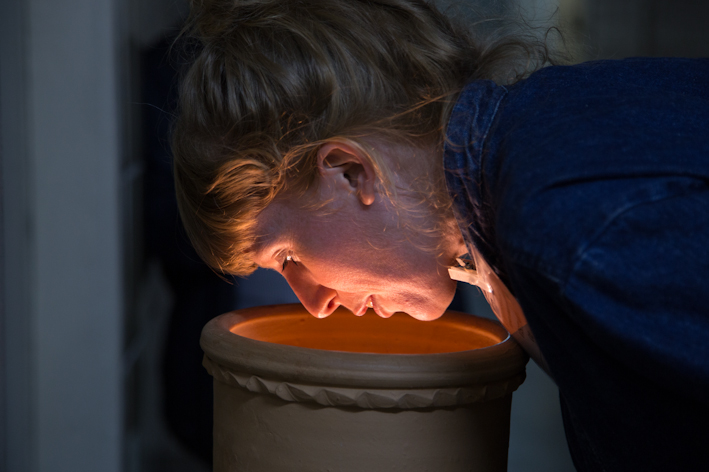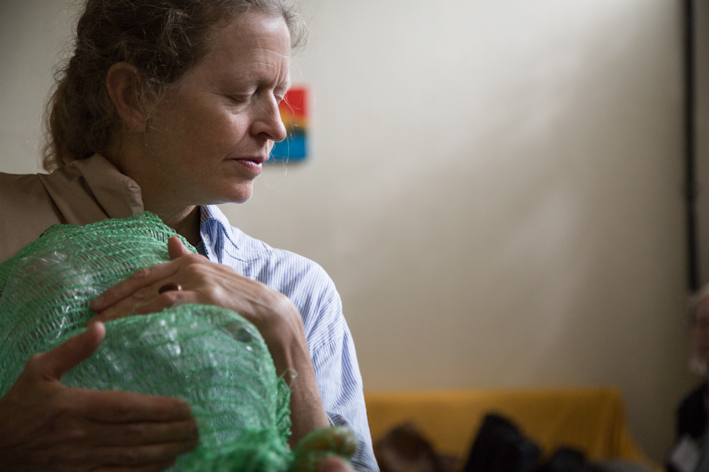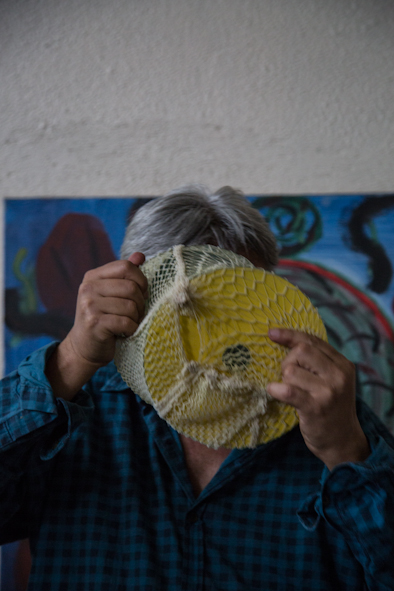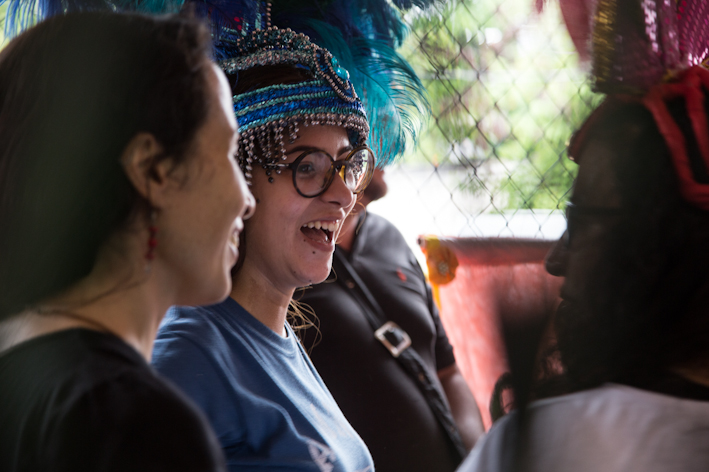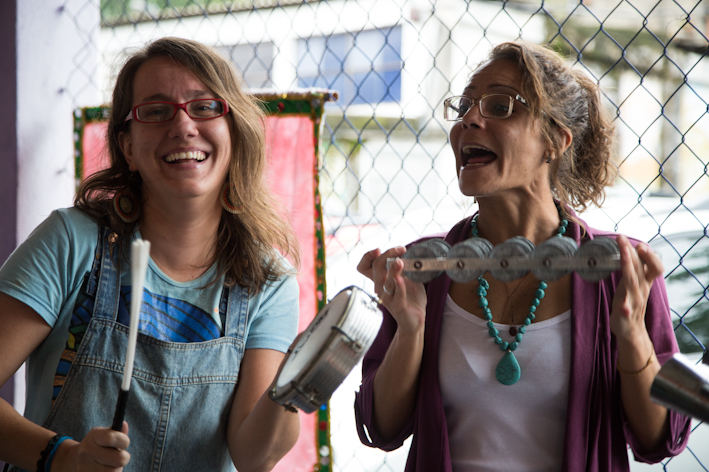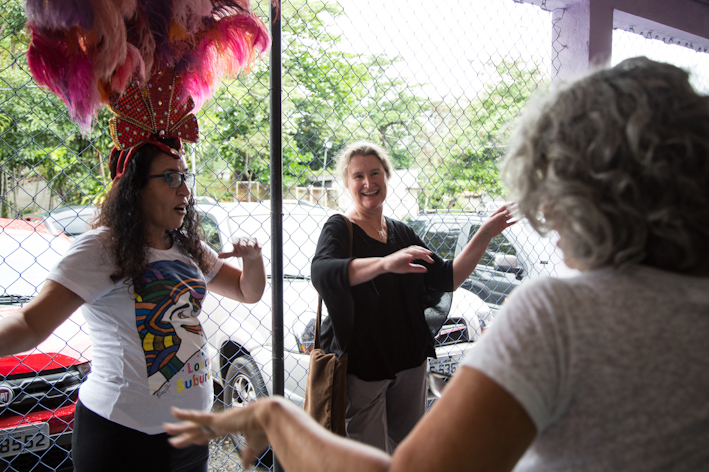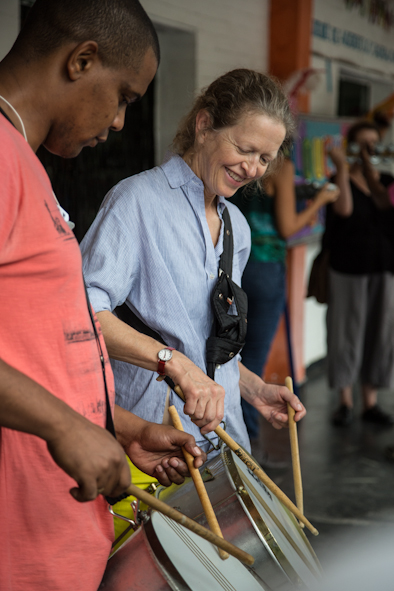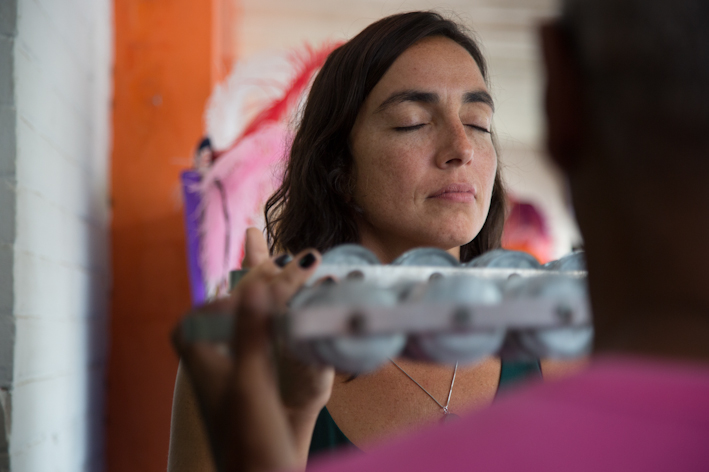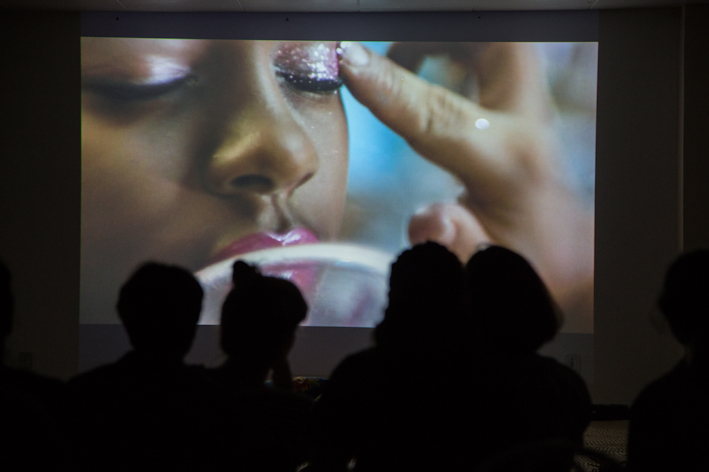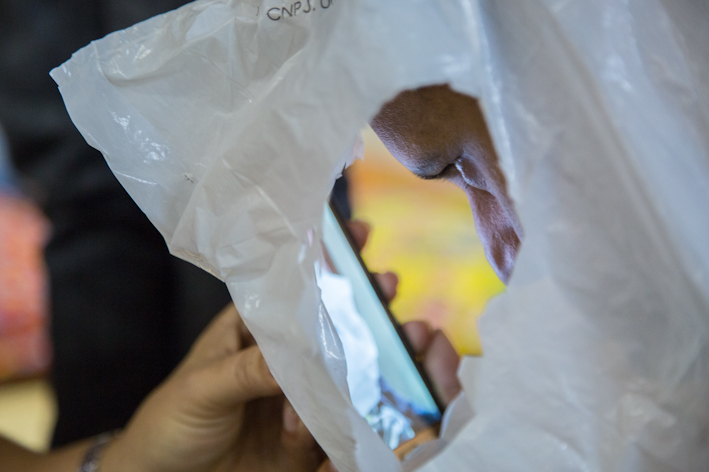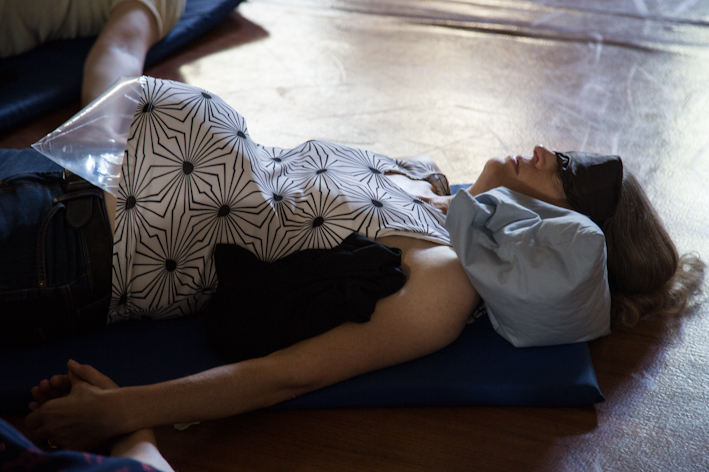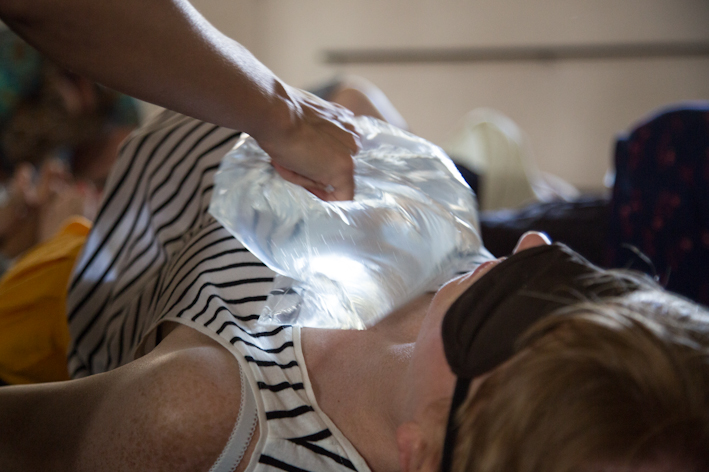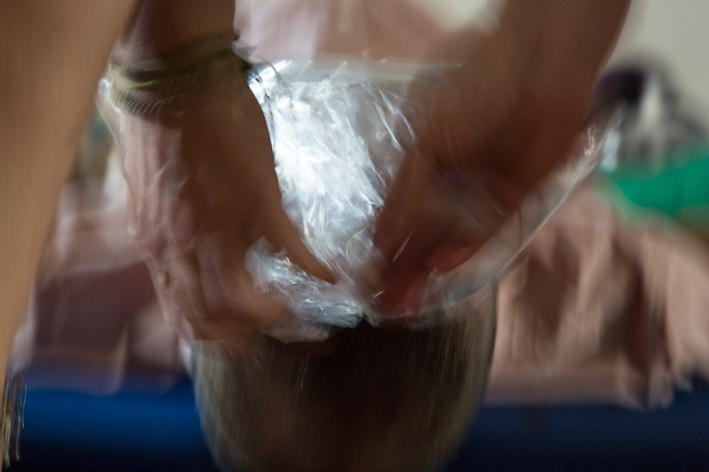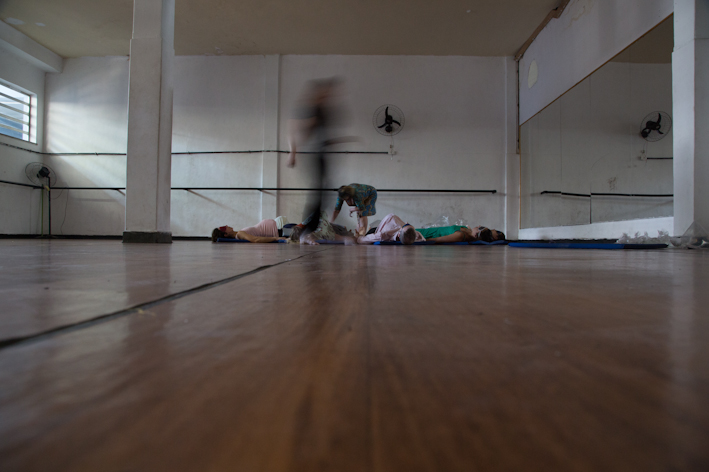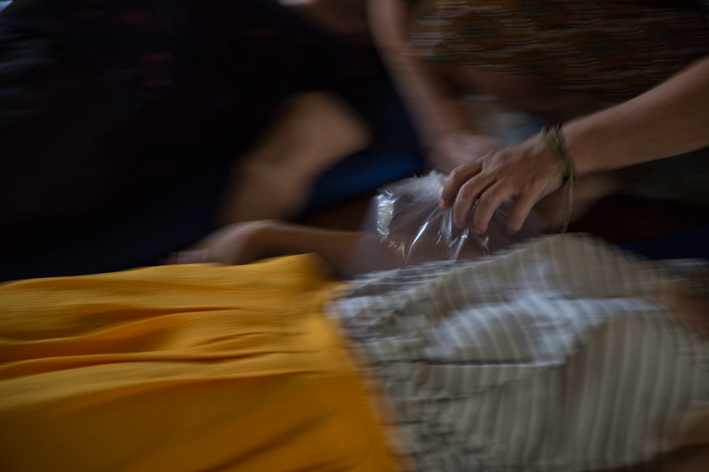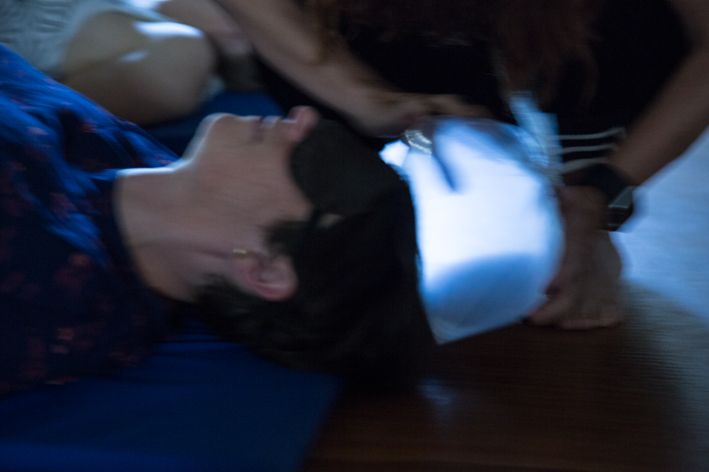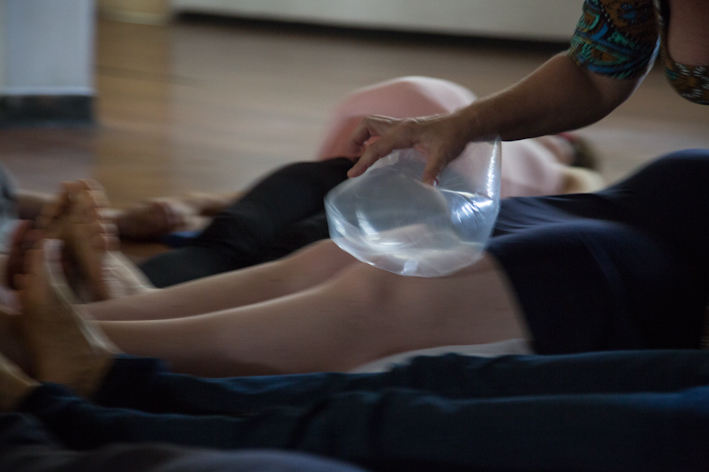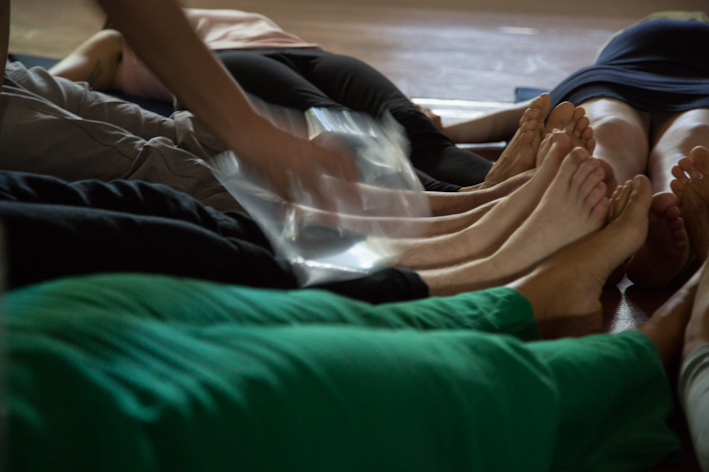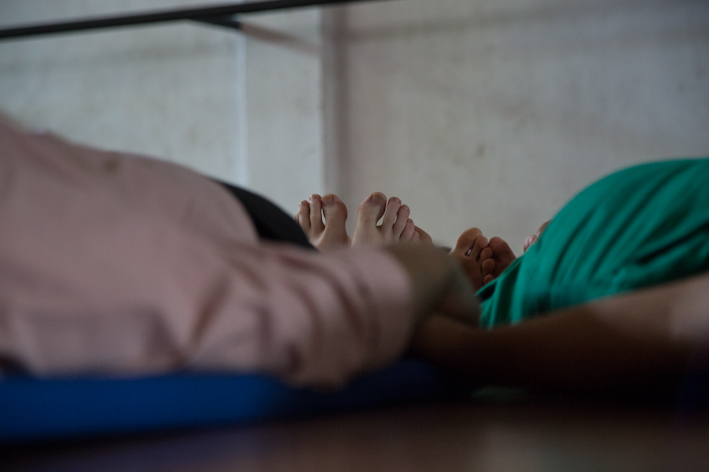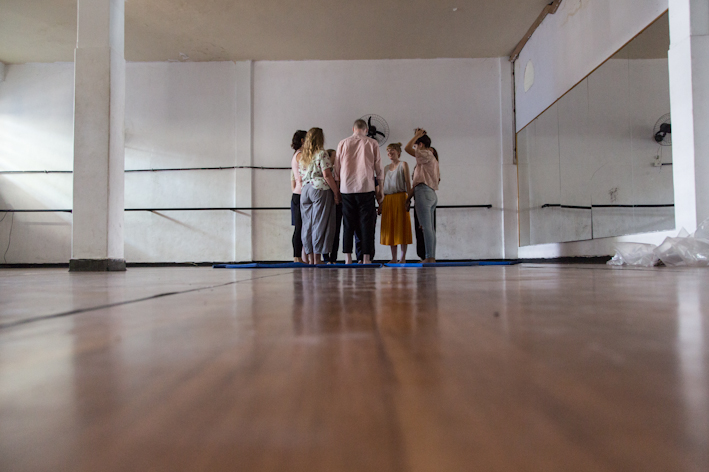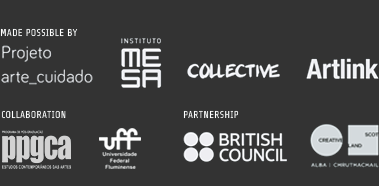Hoje é o dia do sonho [Today is the Day of the Dream]: Poetic musical sarau
Nise da Silveira Municipal Institute, Engenho de Dentro, October 5, 2017
Coordination: Loucura Suburbana and Espaço Aberto ao Tempo
Photo Essay: Denise Adams
Text: Izabela Pucu
The title of the sarau – a tradition of musical, poetic performative gatherings – was borrowed from a poster made by the Brazilian artist Cristina Machado, which was hanging on the wall of the room where we met with Ariadne de Moura Mendes, Lula Wanderley and Gina Ferreira to think about the activity that would happen at the Instituto Municipal Nise da Silveira [Nise da Silveria Municipal Institute], where they work, as part of the international encounter Care as Method # 2. The poster reads, in red print – Hoje é o dia do sonho. And this is what we decided to do together: to establish an extraordinary order in the routine of the hospital, to open a gap in the time-space of that institution; to perform an event that would put dreams (or art) on the agenda, bringing parties, music and poetry as creative apparatuses fostering proximity – what they have long practiced in their work processes, with therapeutic e/affects, in the broadest sense (subjective, psychological and social).
As happened in other processes of the encounter Care as Method # 2, the central idea of the sarau was to reverse traditional vectors and give protagonism to the patients, while also taking care of the caregivers, supporting and giving visibility to the work of people like Ariadne, Lula, Gina and their companions, who for more than 20 years have been working on different fronts, but with the same challenges and precariousness, within the Instituto Municipal Nise da Silveira – a place in which coexists, not always pacifically, models of life and work both anterior and posterior to the psychiatric reform movement.
In this spirit of openness and diversity, after months of conversations, we were welcomed a few days before the Sarau – the coordinators of the Art_Care project and our Scottish partners – in the musical workshop given by Leandro Freixo, who is also responsible for the rehearsals of the band known as Alterado Jazz Band [Altered Jazz Band], an initiative of Espaço Aberto ao Tempo [Space Open to Time (EAT)] coordinated by Lula Wanderley; and in the percussion workshop of the Bloco Carnavalesco Loucura Suburbana coordinated by Ariadne de Moura Mendes, with the musical coordination of Abel Luiz and Fernando Mesquyta as drum master.
In the processes experienced with the members of Loucura Suburbana and EAT, we, the so-called normal ones, were the ones who were disabled. It was us who occupied with our bodies the place of not knowing – not knowing how to play, and in the case of the Scottish contingent not knowing how to speak the language, and also with not knowing how to dance the rhythm of samba, that the passistas [samba dancers], Loucura drummers, patients and professions of the hospital, completely dominated. Hitting and missing together, this undid established hierarchies between those who are and those who are not being treated, between those who care and who are taken care of.
In the EAT music workshop we participated in one of the rehearsals for the Sarau. And there, too, was this exchange of roles; we were greeted by a tightly-knit group that had chosen to rehearse songs in English to include our visitors. So it was the patients who performed the inclusion of those who were the foreigners, by seeking to establish a bond with people and their world both through the use of their mother tongue and musical language that, in a way, is a universal code.
On the day of the Sarau, we were treated to a collective therapeutic session called Rosácea, one of the series of propositions known as Relaxações [Relaxations] created by the artist Lygia Clark in 1974/75. The collective proposal, interpreted by Gina Ferreira based on her research of Clark’s therapeutic set Estruturação do self [Structuring of the Self], was realized in collaboration with the dancer and therapist Ana Vitória Freire and with the participation of the museologist and therapist Márcia Proença. An account of this process is contained in the dialogues section of this magazine.
The Sarau, coordinated by the Bloco Carnavalesco Loucura Suburbana also involved, in addition to members of the Grupo de Ações Poéticas [Group of Poetic Actions] Alterado Jazz Band, originating from EAT: rhythm artists, passistas, singers and Loucura Suburbana composers, invitees from the Oficina Literária [Literary Workshop] of the Clarice Lispector Centro de Atenção Psicosocial [Psychosocial Attention Center CAPS] and the Band 762 comprising patients and professionals of the mental health complex Colônia Juliano Moreira, artists of Atelier Gaia, and staff of the Museu Bispo do Rosário Arte Contemporânea [Bispo do Rosário Museum of Contemporary Art (mBrac)]. There were poems, theatrical skits, there was music, dance and other interventions.
Musical initiatives linked to different services and processes come together for the first time in decades of work. It was lovely to see that many members knew each other and even participated in more than one of the groups. The network that connects these people in their different contexts and practices was visible in a very special and subtle way. This points to the achievement of mobility and autonomy of the patients and users of the mental health service and to their protagonism in the process of reinventing their relationship with the world and their own subjectivities through art, the main therapeutic, cultural and social legacy of such practices.
***
Denise Adams
Denise is an artist, photographer and educator. She graduated in cinema from FAAP in São Paulo and recently received her MA in the Postgraduate Program in Contemporary Studies of the Arts from the Federal Fluminense University (UFF). She has worked as a photojournalist from the newspapers Folha e Estado de São Paulo and Revista Época. She has coordinated workshops on contemporary photography at the Tomie Ohtake Institute and SESC São Paulo. She worked at the Fundação Bienal São Paulo between 2010 and 2013. Using mainly photography and video, her research is related to the recognition and construction of territories and their contours. Her work has been presented in several exhibitions, among them, Cultural Center of São Paulo, Cultural Center of the Federal Justice RJ, Paraty Auction in Focus, MARP Hall, Thomas Cohn Gallery and MAM Bahia Hall.
Izabela Pucu
Izabela is an artist, curator, researcher and cultural manager and currently education coordinator at the Escola de Olhar/Museu de Arte do Rio. She has a PhD in History and Art Criticism PPGAV / EBA / UFRJ. She was director and curator of the Hélio Oiticica Municipal Art Center (2014-2016) and coordinator of projects of the EAV Parque Lage (2008 to 2011). She was a researcher for the book Mário Pedrosa: Primary Documents, eds. Gloria Ferreira and Paulo Herkenhoff (MoMA / NY, 2016) and edited the books Roberto Pontual: Obra crítica (City Hall of Rio / Azougue, 2013), Imediações by Wilson Coutinho (Funarte / Petrobrás, 2008). She has curated numerous exhibitions including: Osmar Dillon: não objetos poéticos (2015), Ivan Henriques: Repaisagem and A lágrima é só o suor do cérebro featuring the work of the artist Gustavo Speridião (2016). She co-ordinates the Art_Care project with Jessica Gogan.
_______
1A Rosácea no encontro Cuidado como método. Um diálogo com Gina Ferreira e Ana Vitória [link]


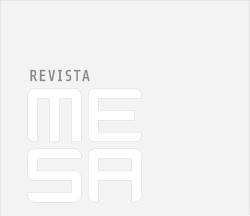
![Hoje é o dia do sonho [Today is the Day of the Dream]. Poetic Musical Sarau, Instituto Municipal Nise de Silvera, October 5, 2017. Photos: Denise Adams](http://institutomesa.org/revistamesa/edicoes/5/wp-content/uploads/2018/12/da_20171005_589.jpg)
![Hoje é o dia do sonho [Today is the Day of the Dream]. Poetic Musical Sarau, Instituto Municipal Nise de Silvera, October 5, 2017. Photos: Denise Adams](http://institutomesa.org/revistamesa/edicoes/5/wp-content/uploads/2018/12/da_20171005_523.jpg)
![Hoje é o dia do sonho [Today is the Day of the Dream]. Poetic Musical Sarau, Instituto Municipal Nise de Silvera, October 5, 2017. Photos: Denise Adams](http://institutomesa.org/revistamesa/edicoes/5/wp-content/uploads/2018/12/da_20171005_520.jpg)
![Hoje é o dia do sonho [Today is the Day of the Dream]. Poetic Musical Sarau, Instituto Municipal Nise de Silvera, October 5, 2017. Photos: Denise Adams](http://institutomesa.org/revistamesa/edicoes/5/wp-content/uploads/2018/12/da_20171005_504.jpg)
![Hoje é o dia do sonho [Today is the Day of the Dream]. Poetic Musical Sarau, Instituto Municipal Nise de Silvera, October 5, 2017. Photos: Denise Adams](http://institutomesa.org/revistamesa/edicoes/5/wp-content/uploads/2018/12/da_20171005_492.jpg)
![Hoje é o dia do sonho [Today is the Day of the Dream]. Poetic Musical Sarau, Instituto Municipal Nise de Silvera, October 5, 2017. Photos: Denise Adams](http://institutomesa.org/revistamesa/edicoes/5/wp-content/uploads/2018/12/da_20171005_486.jpg)
![Hoje é o dia do sonho [Today is the Day of the Dream]. Poetic Musical Sarau, Instituto Municipal Nise de Silvera, October 5, 2017. Photos: Denise Adams](http://institutomesa.org/revistamesa/edicoes/5/wp-content/uploads/2018/12/da_20171005_480.jpg)
![Hoje é o dia do sonho [Today is the Day of the Dream]. Poetic Musical Sarau, Instituto Municipal Nise de Silvera, October 5, 2017. Photos: Denise Adams](http://institutomesa.org/revistamesa/edicoes/5/wp-content/uploads/2018/12/da_20171005_477.jpg)
![Hoje é o dia do sonho [Today is the Day of the Dream]. Poetic Musical Sarau, Instituto Municipal Nise de Silvera, October 5, 2017. Photos: Denise Adams](http://institutomesa.org/revistamesa/edicoes/5/wp-content/uploads/2018/12/da_20171005_462.jpg)
![Hoje é o dia do sonho [Today is the Day of the Dream]. Poetic Musical Sarau, Instituto Municipal Nise de Silvera, October 5, 2017. Photos: Denise Adams](http://institutomesa.org/revistamesa/edicoes/5/wp-content/uploads/2018/12/da_20171005_447.jpg)
![Hoje é o dia do sonho [Today is the Day of the Dream]. Poetic Musical Sarau, Instituto Municipal Nise de Silvera, October 5, 2017. Photos: Denise Adams](http://institutomesa.org/revistamesa/edicoes/5/wp-content/uploads/2018/12/da_20171005_424.jpg)
![Hoje é o dia do sonho [Today is the Day of the Dream]. Poetic Musical Sarau, Instituto Municipal Nise de Silvera, October 5, 2017. Photos: Denise Adams](http://institutomesa.org/revistamesa/edicoes/5/wp-content/uploads/2018/12/da_20171005_405.jpg)
![Hoje é o dia do sonho [Today is the Day of the Dream]. Poetic Musical Sarau, Instituto Municipal Nise de Silvera, October 5, 2017. Photos: Denise Adams](http://institutomesa.org/revistamesa/edicoes/5/wp-content/uploads/2018/12/da_20171005_376.jpg)
![Hoje é o dia do sonho [Today is the Day of the Dream]. Poetic Musical Sarau, Instituto Municipal Nise de Silvera, October 5, 2017. Photos: Denise Adams](http://institutomesa.org/revistamesa/edicoes/5/wp-content/uploads/2018/12/da_20171005_361.jpg)
![Hoje é o dia do sonho [Today is the Day of the Dream]. Poetic Musical Sarau, Instituto Municipal Nise de Silvera, October 5, 2017. Photos: Denise Adams](http://institutomesa.org/revistamesa/edicoes/5/wp-content/uploads/2018/12/da_20171005_322.jpg)
![Hoje é o dia do sonho [Today is the Day of the Dream]. Poetic Musical Sarau, Instituto Municipal Nise de Silvera, October 5, 2017. Photos: Denise Adams](http://institutomesa.org/revistamesa/edicoes/5/wp-content/uploads/2018/12/da_20171005_305.jpg)
![Hoje é o dia do sonho [Today is the Day of the Dream]. Poetic Musical Sarau, Instituto Municipal Nise de Silvera, October 5, 2017. Photos: Denise Adams](http://institutomesa.org/revistamesa/edicoes/5/wp-content/uploads/2018/12/da_20171005_276.jpg)
![Hoje é o dia do sonho [Today is the Day of the Dream]. Poetic Musical Sarau, Instituto Municipal Nise de Silvera, October 5, 2017. Photos: Denise Adams](http://institutomesa.org/revistamesa/edicoes/5/wp-content/uploads/2018/12/da_20171005_257.jpg)
![Hoje é o dia do sonho [Today is the Day of the Dream]. Poetic Musical Sarau, Instituto Municipal Nise de Silvera, October 5, 2017. Photos: Denise Adams](http://institutomesa.org/revistamesa/edicoes/5/wp-content/uploads/2018/12/da_20171005_247.jpg)
![Hoje é o dia do sonho [Today is the Day of the Dream]. Poetic Musical Sarau, Instituto Municipal Nise de Silvera, October 5, 2017. Photos: Denise Adams](http://institutomesa.org/revistamesa/edicoes/5/wp-content/uploads/2018/12/da_20171005_189.jpg)
![Hoje é o dia do sonho [Today is the Day of the Dream]. Poetic Musical Sarau, Instituto Municipal Nise de Silvera, October 5, 2017. Photos: Denise Adams](http://institutomesa.org/revistamesa/edicoes/5/wp-content/uploads/2018/12/da_20171005_154.jpg)
